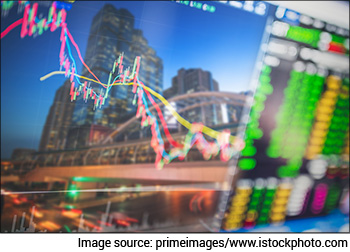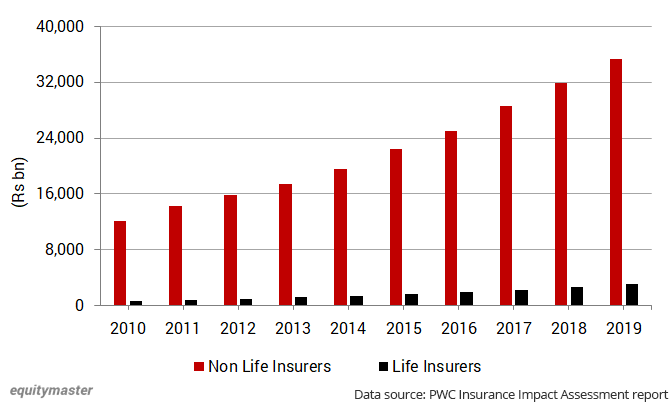India's Third Giant Leap
This Could be One of the Biggest Opportunities for Investors
- Home
- Todays Market
- Indian Stock Market News September 27, 2022
Sensex Trades Marginally Higher, Nifty Above 17,000; Britannia, ITC & HUL Top Gainers Tue, 27 Sep 10:30 am

Asian share markets are trading in green today as investors looked at beaten down sectors following sharp falls in recent days on fears over an economic slowdown.
The Nikkei is up 0.6% while the Shanghai Composite gained 0.3%. The Hang Seng is down 1.1%.
In US stock markets, Wall Street indices slipped again overnight and confirmed entry into a bear market, as investors fretted that the Federal Reserve's aggressive campaign against inflation could throw the US economy into a sharp downturn.
The Dow Jones slumped 1.1% while the Nasdaq tumbled 0.6%.
Back home, Indian share markets are trading on a positive note, following the trend on SGX Nifty.
The BSE Sensex is trading up by 126 points. Meanwhile, the NSE Nifty is trading higher by 27 points.
HUL and Nestle India are among the top gainers today. Maruti Suzuki, on the other hand, is among the top losers today.
The BSE Mid Cap index is down 0.2% while the BSE Small Cap is trading higher by 0.3%.
Sectoral indices are trading on a mixed note with stocks in the FMCG sector, oil & gas sector and banking sector witnessing most of the buying.
Auto and metal stocks on the other hand, are trading in red.
Shares of Metro Brands and Bharat Fertilizers hit their 52-week highs today.
The rupee is trading at 81.34 against the US$. Yesterday, the rupee slumped 58 paise to close at a fresh lifetime low of 81.67 against the US dollar.
Crude oil prices are trading in green today as indications that producer alliance OPEC+ sought to avoid a collapse in prices, along with a slight softening in the US dollar, tempered an earlier selloff.
Gold prices are trading down by 0.1% at Rs 49,139 per 10 grams.
Meanwhile, silver prices are trading up by 0.2% at Rs 55,417 per kg.
Speaking of stock markets, chartist Brijesh Bhatia does a complete analysis of today's market and what to expect today, in the video below.
In news from the insurance sector, the Insurance Regulatory and Development Authority of India (IRDAI) has formed a committee to overhaul the sector's rules with the aim to reduce redundancies and make it easier for companies to do business.
According to media reports, the committee was formed earlier this month and has been given six to eight weeks for a comprehensive review of the 70 or so regulations governing the industry to ensure principal bases regulations.
The committee will look at streamlining regulations to avoid duplicates and simplify rules.
The committee includes representatives from intermediaries like brokers and third-party administrators, officials from the IRDAI, and some large government insurance companies like Life Insurance Corporation (LIC), New India Assurance and GIC.
Speaking of the insurance sector, have a look at the chart below which shows the investment assets of non-life insurers and life insurers over the past 10 years:
Investment Assets of Non-Life Insurers 11x That of Life Insurers

As per Tanushree Banerjee, Co-Head of Research at Equitymaster, the above chart is enough proof of how big an earning opportunity is the zero-cost float to the non-life insurers. Their investment assets under management is nearly 11 times that of life insurers.
Moving on to news from the FMCG sector, India's top FMCG companies Hindustan Unilever and Nestle have red-flagged steep inflation across core commodities as the single biggest factor impacting their bottom lines over the past one year.
They are of the view that they cannot reduce consumer prices due to high cost of other raw materials.
This comes at a time when palm oil, which is a key ingredient for products from processed foods to cosmetics and soaps, is trading at its lowest levels since June last year.
Edible oils prices have been falling over the past month, and companies expect prices to reduce further.
Edible oil companies are passing on the reduction in costs to consumers.
While the raw material prices have softened selectively, FMCG companies said the decline isn't enough to offset profit stress as prices remain significantly higher on a year-on-year basis.
Note that in the current uncertain market situation, investors are looking at FMCG stocks and best pharma stocks as these are considered defensive bets.
Moving on, Tata Motors is planning to invest around Rs 20 bn in its commercial vehicle business per annum going ahead in order to drive in new models based on various kinds of powertrains, according to company's Executive Director Girish Wagh.
The company, which on Monday strengthened its pickup line with the launches of Yodha 2.0, Intra V20 bi-fuel and Intra V50 models, is also looking to transition to electric mobility through vehicles powered by CNG and other alternative fuel option.
Wagh said that the company has started the production of Tata Ace EV, and the deliveries were expected to begin next month.
Tata Motors currently has a market share trading around 40% in the small commercial vehicle segment.
Note that Tata group companies are the top buzzing stocks in the market these days as the group last week announced to merger steel subsidiaries with Tata Steel.
The Tata group is reportedly planning to halve number of listed companies to boost competitive strength.
In the automobile sector, the group has three listed companies - Tata Motors, Automotive Stampings & Assemblies, and Automobile Corp. of Goa Ltd.
One other company, Tata Autocomp Systems, is unlisted.
It remains to be seen how the consolidation takes place and how it simplifies management.
To know what's moving the Indian stock markets today, check out the most recent share market updates here.
For information on how to pick stocks that have the potential to deliver big returns, download our special report now!
Read the latest Market Commentary


Equitymaster requests your view! Post a comment on "Sensex Trades Marginally Higher, Nifty Above 17,000; Britannia, ITC & HUL Top Gainers". Click here!
Comments are moderated by Equitymaster, in accordance with the Terms of Use, and may not appear
on this article until they have been reviewed and deemed appropriate for posting.
In the meantime, you may want to share this article with your friends!